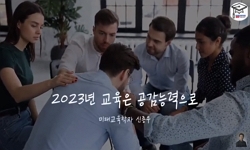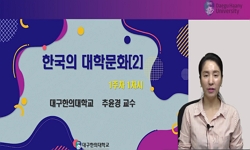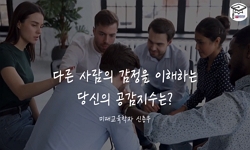This paper analyzes the symptomatic experiences in everyday life which are related to neo-liberalism, especially focusing on a university society (student/professor), how the ‘competition principle’ and ‘outcome principle’ as side effects of n...
http://chineseinput.net/에서 pinyin(병음)방식으로 중국어를 변환할 수 있습니다.
변환된 중국어를 복사하여 사용하시면 됩니다.
- 中文 을 입력하시려면 zhongwen을 입력하시고 space를누르시면됩니다.
- 北京 을 입력하시려면 beijing을 입력하시고 space를 누르시면 됩니다.

신자유주의와 마음의 고고학-향수를 넘어서 성찰로, 잃어버린 마음/행동/태도에 대한 책임의 인문학 = Neo-Liberalism and Archaeology of the Mind - Beyond Nostalgia toward Reflection, Humanities of Responsibility on Lost Mind/Behavior/Attitude -
한글로보기https://www.riss.kr/link?id=A100126395
- 저자
- 발행기관
- 학술지명
- 권호사항
-
발행연도
2014
-
작성언어
-
-
주제어
신자유주의 ; 대학 문화 ; 성과주의 ; 위기 ; 자기계발 ; 자기계발의 역설 ; 소통의 역설 ; 스펙 ; 인맥 ; 책임 ; 우정 ; 공감 능력 ; 존경 ; 자기조형술 ; 성찰의 윤리 ; neo-liberalism ; academic culture ; outcome principle ; crisis ; self-improvement ; qualification ; human resource ; responsibility ; friendship ; capacity of empathy ; respec
-
KDC
900
-
등재정보
KCI등재
-
자료형태
학술저널
-
수록면
245-284(40쪽)
-
KCI 피인용횟수
6
- 제공처
- 소장기관
-
0
상세조회 -
0
다운로드
부가정보
다국어 초록 (Multilingual Abstract)
This paper analyzes the symptomatic experiences in everyday life which are related to neo-liberalism, especially focusing on a university society (student/professor), how the ‘competition principle’ and ‘outcome principle’ as side effects of neo-liberalism influence individual personalities and human relationships, and how such side effects weaken human life (personality, relationship, ordinary life) when engaged within a digitalized information-oriented society. When students and professors at universities began to adapt themselves to neo-liberalism, it led to the ‘paradox of self-improvement’ (the more they concentrate on self-improvement, the more they self-alienate themselves). In a digitalized information-oriented society, human relationships were substitutes for the human property, were related to a purpose-oriented object, causing the ‘paradox of communication’ (i.e., discord between communicative quantity and quality, an uncorrelated relation between communication speedup and the value of friendship/respect/cooperation). This paper discusses the academic tendencies of neo-liberalism and suggests the following conclusion. First, most analyses focused on diagnosing crises in contemporary society which were influenced by neo-liberalism, but they lacked a strategy or method to overcome the negative effects. Second, most methodologies in the humanities concentrated on the criticism itself, not on reflective behaviors. This paper suggests a reestablishment and the development of reflective critical terms and ways of thinking based on responsibility and practice. Third, this paper analyzes personal terms through traditional writings which are life-reflective texts as a form of historical heritage about humanities. Fourth, this paper insists that universities organize a new humanities educational program to cultivate students` empathetic abilities, and their potential to develop an ‘ethics of reflection’. With these social and educational practical ideas, the university should dedicate itself to promoting in social agents a collaborative attitude, with harmonious symbiotic ideas and an aesthetical perspective toward human society and human beings we well.
참고문헌 (Reference)
1 김태환, "피로사회" 문학과지성사 2012
2 김태환, "투명사회" 문학과지성사 2014
3 Richard Sennett, "투게더" 현암사 2013
4 Zigmunt Bauman, "친애하는 빅브라더, Liquid Surveillance" 오월의 봄 2014
5 트렌드모니터, "취업 스펙에 관한 조사" 트렌드모니터 (1) : 2013
6 정철민, "초복잡성 사회의 대학 이념과 교육과정" 한국교육철학학회 33 (33): 185-202, 2011
7 박웅기, "청소년의 SNS 중독에 관한 탐색적 연구" 한국지역언론학회 13 (13): 305-342, 2013
8 구동모, "지방대학의 위기와 그 해결의 실마리" 한국지역사회연구소 43 : 2003
9 김미정, "중년과 노인의 심리적 안녕감 영향요인" 동서간호학연구소 19 (19): 150-158, 2013
10 권대중, "좀비 대학: 영혼이 죽은 대학" 대한철학회 125 : 1-19, 2013
1 김태환, "피로사회" 문학과지성사 2012
2 김태환, "투명사회" 문학과지성사 2014
3 Richard Sennett, "투게더" 현암사 2013
4 Zigmunt Bauman, "친애하는 빅브라더, Liquid Surveillance" 오월의 봄 2014
5 트렌드모니터, "취업 스펙에 관한 조사" 트렌드모니터 (1) : 2013
6 정철민, "초복잡성 사회의 대학 이념과 교육과정" 한국교육철학학회 33 (33): 185-202, 2011
7 박웅기, "청소년의 SNS 중독에 관한 탐색적 연구" 한국지역언론학회 13 (13): 305-342, 2013
8 구동모, "지방대학의 위기와 그 해결의 실마리" 한국지역사회연구소 43 : 2003
9 김미정, "중년과 노인의 심리적 안녕감 영향요인" 동서간호학연구소 19 (19): 150-158, 2013
10 권대중, "좀비 대학: 영혼이 죽은 대학" 대한철학회 125 : 1-19, 2013
11 최기숙, "조선시대(17세기-20세기 초) 壽序의 문예적 전통과 壽宴 문화" 열상고전연구회 (36) : 99-142, 2012
12 서동진, "자유의 의지 자기계발의 의지" 돌베개 2009
13 김태일, "이공계 위기의 현황과 정책 대안: 대학 교육의 개혁을 중심으로" 한국정책학회 14 (14): 211-241, 2005
14 한민구, "이공계 대학교육의 위기와 대응" 한국공학기술학회 9 (9): 2002
15 Ulrich Beck, "위험사회" 새물결 2006
16 오찬호, "우리는 차별에 찬성한다: 괴물이 된 이십대의 자화상" 개마고원 1-239, 2013
17 김소정, "온라인-오프라인 자기개방이 공동체 소속감과 행복감에 미치는 영향:수평적 집단주의와 수직적 집단주의의 비교" 사이버커뮤니케이션학회 30 (30): 5-42, 2013
18 이혜정, "여성주의, 우정 그리고 도덕적 성장" 한국여성철학회 18 : 123-150, 2012
19 Richard Sennett, "신자유주의와 인간성의 파괴" 문예출판사 2002
20 김철, "신자유주의 시대 경쟁과 과시" 한국사회이론학회 (41) : 69-99, 2012
21 Martha C. Nussbaum, "시적 정의" 궁리 2013
22 한병철, "시간의 향기" 문학과지성사 2014
23 강은희, "스펙초월 청년취업시스템" 한국경제연구원 2012
24 Eva Illouz, "사랑은 왜 아픈가: 사랑의 사회학" 돌베개 2013
25 柄谷行人, "마르크스 그 가능성의 중심" 이산 1999
26 신승환, "대학의 이념: 이상과 종말 사이에서" 인간학연구소 (21) : 185-192, 2011
27 이광주, "대학의 역사와 문화 2" 대학사학회 2005
28 김상아, "대학생활 기대-만족차이와 심리적 안녕감의 관계연구 : 성격적 특성 매개효과" 교육연구소 12 (12): 25-42, 2011
29 김범준, "대학생의 행복에 영향을 미치는 행복/불행 관련 사건들에 관한 연구" 한국사회및성격심리학회 25 (25): 115-135, 2011
30 이정애, "대학생의 주관적 안녕감과 사회인지적 변인 간의 구조관계 분석" 한국직업교육학회 32 (32): 97-116, 2013
31 고영남, "대학생의 성격유형과 안녕감(well-being)의 관계" 안암교육학회 18 (18): 49-71, 2012
32 이옥형, "대학생의 생활스트레스, 자아탄력성 및 사회적 지지가 심리적 안녕감에 미치는 영향" 한국청소년학회 19 (19): 29-57, 2012
33 이성원, "대학, 국가, 인문학" 대한교양교육학회 3 (3): 2009
34 서왕진, "대학 캠퍼스의 난개발 열풍과 대학의 위기" 환경과 생명 29 : 2001
35 김성우, "대학 교양교육의 위기와 인문학의 미래" 한국철학사상연구회 20 (20): 11-42, 2009
36 Aristoteles, "니코마코스 윤리학" 이제이북스 2008
37 최기숙, "노년기 여성적 삶의 공론장, 17~19세기 여성 대상 壽序 -여성의 ‘잘 나이들기’에 대한 생애 성찰과 여성적 삶의 전범화" 한국고전여성문학회 (23) : 87-129, 2011
38 C. S. Lewis, "네 가지 사랑" 홍성사 2005
39 柄谷行人, "근대문학의 종언" 도서출판 2005
40 홍덕률, "교수사회의 위기와 극복방안" 역사문제연구소 (67) : 44-72, 2004
41 최기숙, "고통의 상상력: 청소년의 행동문법을 許하라" 2014
42 신광영, "계급과 스펙경쟁" 한국사회학회 2012
43 Paul Lafargue, "게으를 수 있는 권리" 새물결 2005
44 최기숙, "惠寰‧無名子‧沆瀣의 비평적 글쓰기를 통해 본 ‘人-文’의 경계와 글쓰기의 형이상학" 국학연구원 (155) : 177-219, 2011
45 박영신, "‘대학의 장막’과 정당성 위기: 교수 채용 문제와 관련하여" 한국인문사회과학원 17 (17): 1993
46 M. Friedman, "What are Friends for?: Feminist Perspectives on Personal Relationships and Moral Theory" Cornell University Press 1993
47 David Lyon, "Theorizing Surveillance: The panopticon and beyond" Routledge 2006
48 Jacques Derrida, "The Politics of Friendship, translated by George Collins" Verso Books 2006
49 정현선, "SNS의 언어 현상과 소통 공간에 관한 국어교육적 고찰" 한국어교육학회 (142) : 79-114, 2013
50 정석환, "SNS에 기반 한 의사소통 사회의 자아와 교육" 안암교육학회 19 (19): 315-341, 2013
51 조현숙, "SNS시대의 인간, 분열된 주체인가? 확장된 주체인가? -오직 ‘빈 지대’에서 말(Speaking)하리라!-" 한국목회상담학회 20 : 147-183, 2013
52 L.A.Blum, "Friendship, Altruism, and Morality" Routledge & Kegan Paul 1-244, 1980
동일학술지(권/호) 다른 논문
-
<기획> 근대 한국 구상의 사상적/제도적 성찰 : 개화기 조선의 民會 활동과 「議會通用規則」 -「의회통용규칙」의 유통과 번역 양상을 중심으로
- 연세대학교 국학연구원
- 류충희 ( Chung Hee Ryu )
- 2014
- KCI등재
-
<기획> 근대 한국 구상의 사상적/제도적 성찰 : 위당(爲堂) 정인보(鄭寅普)의 실학(實學)인식과 학문주체론 - 「양명학연론(陽明學演論)」을 중심으로 -
- 연세대학교 국학연구원
- 정덕기 ( Duk Gi Jung )
- 2014
- KCI등재
-
- 연세대학교 국학연구원
- 김진희 ( Jin Hee Kim )
- 2014
- KCI등재
-
삼한(參韓) 인식의 연원과 통일전쟁기 신라(新羅)의 천하관(天下觀)
- 연세대학교 국학연구원
- 윤경진 ( Kyeong Jin Yoon )
- 2014
- KCI등재
분석정보
인용정보 인용지수 설명보기
학술지 이력
| 연월일 | 이력구분 | 이력상세 | 등재구분 |
|---|---|---|---|
| 2026 | 평가예정 | 재인증평가 신청대상 (재인증) | |
| 2020-01-01 | 평가 | 등재학술지 유지 (재인증) |  |
| 2017-01-01 | 평가 | 등재학술지 유지 (계속평가) |  |
| 2014-01-20 | 학술지명변경 | 외국어명 : 미등록 -> THE DONG BANG HAK CHI |  |
| 2013-01-01 | 평가 | 등재 1차 FAIL (등재유지) |  |
| 2010-01-01 | 평가 | 등재학술지 유지 (등재유지) |  |
| 2008-01-01 | 평가 | 등재학술지 유지 (등재유지) |  |
| 2005-01-01 | 평가 | 등재학술지 선정 (등재후보2차) |  |
| 2004-01-01 | 평가 | 등재후보 1차 PASS (등재후보1차) |  |
| 2003-01-01 | 평가 | 등재후보학술지 선정 (신규평가) |  |
학술지 인용정보
| 기준연도 | WOS-KCI 통합IF(2년) | KCIF(2년) | KCIF(3년) |
|---|---|---|---|
| 2016 | 1.23 | 1.23 | 1.13 |
| KCIF(4년) | KCIF(5년) | 중심성지수(3년) | 즉시성지수 |
| 1.06 | 0.97 | 2.154 | 0.15 |




 KCI
KCI 스콜라
스콜라







